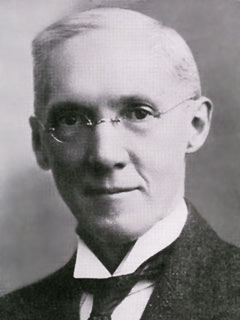 Perhaps no other figure had such a profound impact on Career and Technical Education in the early 20th century than The Ohio State University’s own William T. Magruder. Born in Baltimore on September 22, 1861, Magruder graduated from Stevens Institute of Technology (New Jersey) in 1881 before working in industry and entering Johns Hopkins University for advanced work in chemistry and mathematics in 1886-87. From 1887 to 1896, Magruder served as instructor then adjunct professor of mechanical engineering at Vanderbilt University. Magruder then came to Ohio State in 1896 where he was a full professor and chairman of mechanical engineering at OSU for 34 years until 1930 (Ohio State News Service).
Perhaps no other figure had such a profound impact on Career and Technical Education in the early 20th century than The Ohio State University’s own William T. Magruder. Born in Baltimore on September 22, 1861, Magruder graduated from Stevens Institute of Technology (New Jersey) in 1881 before working in industry and entering Johns Hopkins University for advanced work in chemistry and mathematics in 1886-87. From 1887 to 1896, Magruder served as instructor then adjunct professor of mechanical engineering at Vanderbilt University. Magruder then came to Ohio State in 1896 where he was a full professor and chairman of mechanical engineering at OSU for 34 years until 1930 (Ohio State News Service).
Magruder was also active in many engineering, educational, and fraternal organizations, serving as officers in the majority of them, including the Ohio branch of The National Society for the Promotion of Industrial Education (which later became the American Vocational Association), one of the main forces in the implementation of early secondary trade and industrial schools (Johnston, 1970).
As seen in his personal correspondence with university administration and legislators, published works, and dozens of delivered speeches, William T. Magruder was a man of great conviction and drive for the creation of Ohio State’s Industrial Education program, the State of Ohio’s initiative in the development of early career centers as a supplement or alternative to secondary school, and the overall advancement of vocational education as society shifted from agrarian to industrial. In a 1907 address to The Ohio Society of Electrical and Steam Engineers, Magruder highlighted the current challenge faced by America’s educational system and the importance of trade education:
“…But when it comes to those technical, industrial, commercial, and utilitarian educations which are not professional, but strictly useful, and which teach a man or woman to make the most of their talents, how to earn the largest wages, and to be something more than merely a cog in the industrial machine, when it comes to those educations which are neither strictly cultural nor professional, the state relegates them to the public-spirited philanthropy of its citizens, and to selfish motives, or lets work go undone. As a result, the large majority of our school population are not receiving that training which will increase their ambition and intelligence as wage earners. Fortunately, we are still capable of learning by the experience of others” (Johnston, 1970, p. 8).
Offering principles for successful teaching practices, Magruder later proposed that, “Teaching should be practical as well as theoretical. No principle or theory should be taught without its immediate application to the trade or industry … One reason why so many of our high school pupils fail to make good, and especially in mathematics, is because they do not see the logic of the subject, and the sense and utility of the process” (Ohio Department of Education, 1997, p. 7). It is also believed that Magruder was one of the first to propose advisory boards, a group of people from industry experience that counsel local teacher-trainers in the direction of their program (Ohio Department of Education, 1997).
Magruder was indeed at the forefront of the burgeoning vocational education movement and a behind-the-scenes leader that greatly influenced the direction of Career and Technical Education not only at The Ohio State University but also throughout the state and nation.